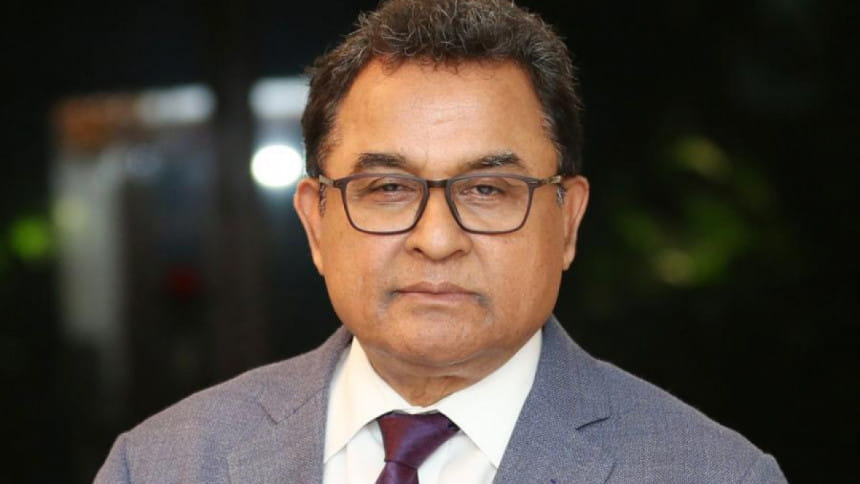Budget 2022-23: Kamal determined to ride out uncertainty

AHM Mustafa Kamal, whose life has been full of struggles, had dreamt of becoming the finance minister, so he consciously entered politics.
The dream came true in January 2019. But with the fulfilment of the dream came challenges.
Just days before the budget unveiling in the year, he was struck with dengue fever.
He was taken to hospital. He came to parliament in an ambulance straight from there although he had not recovered fully.
But he managed to summon up enough strength to rise from his seat and delivered his maiden budget speech.
He was so weak that he had to stop midway the speech. In an unprecedented incident, the prime minister stepped forward and finished reading the unfinished part.
"Nothing was hampered," recalled Kamal, while speaking to The Daily Star on Monday.
Troubles did not spare him as he had to deliver the next two budgets amid the coronavirus pandemic, the worst crisis the world has ever seen since the Great Depression of the 1930s and Bangladesh has ever seen since its independence.
The highly contagious and deadly virus meant Kamal, who was 72 when Covid-19 hit the country and belongs to the very high-risk group, had to frame the budget, maintaining strict health protocols.
"This was the time when people were fleeing cities. The economy came to a screeching halt. People lost jobs. They had neither money nor food. It was a terrible situation," said Kamal.
"Still, we managed to formulate budgets during the pandemic taking into account the crisis's impacts on the global economy as well as our economy. We were able to present superb budgets amid odds."
In response to the first wave of the pandemic, Kamal, at the instruction of the prime minister, introduced a sizeable number of social safety schemes and stimulus packages to protect the people, the businesses and the economy.
Bangladesh was, in fact, among the first group of countries that unveiled stimulus packages.
"At that time, I used to talk to finance ministers from other countries to know about their situation. When I sought suggestions from them on how to deal with the situation, they could not share any, since they did not know what to do to tackle the pandemic."
Kamal shared with them that he was going to pursue expansionary monetary policy and strengthen the stimulus packages despite lower revenue collection, sowing the seed for the turnaround of the economy in style.
Other countries also followed expansionary monetary policies, proving Kamal's strategy right.
"We extended as much support as possible by raising the budget deficit. We have been successful ultimately," he said.
He identified four drivers that helped Bangladesh make a comeback faster than most economies in the world.
"She is the best prime minister I have ever seen," said Kamal, referring to the country's longest-serving prime minister, Sheikh Hasina.
The second driver has been the population of the country.
"Such a resilient population can't be found in any other country. They are courageous and enterprising and are always ready to tackle challenges. They have not stopped working because of the pandemic as it happened in many other countries," said Kamal.
The third driving force, according to the minister, is a stable government.
"We have been able to implement our jobs efficiently thanks to the stability of the government."
The success in implementation of policies has been the fourth driver.
"What else do you need to take the economy forward?" said the finance minister.
Kamal is now preparing for meeting the biggest challenge confronting the nation, as he is set to place his fourth budget in parliament today.
The Russia-Ukraine war has intensified volatility globally and is threatening to derail the recovery trajectory.
As a largely import-dependent nation, Bangladesh has been also hit hard owing to higher commodity prices, record freight costs and supply disruptions.
Accelerated import costs put a strain on the foreign currency reserves and forced the government to move away from its managed floating exchange rate regime.
But Kamal is hopeful of remaining insulated from the challenge and his confidence springs from the outward movement of migrant workers as global economies reopen.
"We will send the highest number of migrant workers this fiscal year," he said.
Another comfort for Bangladesh comes from the fact that the country's export-oriented items are mostly consumed by the low and middle-income groups in the western countries.
Kamal will put emphasis on controlling inflation and some sectors such as agriculture, health, human resources, and employment generation in the new budget, said the finance ministry in a press release yesterday.
"The marginalised population will get priority in the upcoming budget."

 For all latest news, follow The Daily Star's Google News channel.
For all latest news, follow The Daily Star's Google News channel. 








Comments